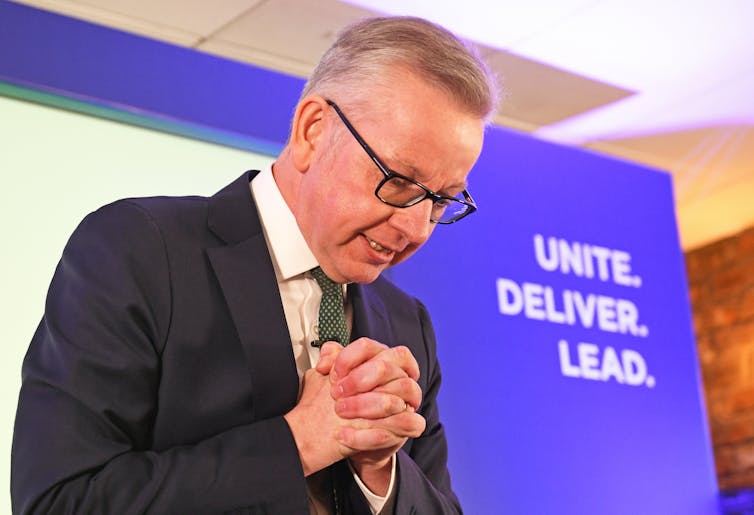The Conservative leadership contest is entering its most intense phase. Potential leaders are being whittled down by their parliamentary colleagues before the party’s roughly 160,000 members vote on which of the final two will get the top job in British politics.
It’s inevitable that one topic has come to dominate the discussion in the contest. Much of the focus will be on the candidates’ plans (or lack of plans) for Brexit. That is somewhat inevitable, given this is the most prominent issue in British politics and the fact that Theresa May’s departure is largely due to her inability to find a Brexit “plan B” after the House of Commons rejected her deal.
Each contender is promoting a different Brexit vision in their campaign. But the EU says the deal on the table cannot be renegotiated. And if many of the candidates are to be believed, the UK is ready to leave without a deal on October 31. So there appears to be little scope for a change of course.
Meanwhile, the next Conservative leader does not have to call a general election until 2022. Of course an election can be forced by a vote of no confidence, but 2022 must be the focal point for this campaign.
Given that the next leader has the potential to lead the country for the best part of the next three years, focusing solely on an issue which most candidates say should be resolved in little over the next three months seems short sighted. The successful candidate should have strong positions on other issues too, and these should be clearly outlined in the campaign. Here are some of the topics we need to see covered.
Austerity
It has been eight months since May declared that “austerity is over” (though the chancellor Phillip Hammond has been more cautious, saying only that austerity is coming to an end). Such austerity-driven policies are continuing to hit families, as a recent UN report demonstrated, when it claimed 14m people in the UK live in poverty and 1.5m are destitute.
Even if the government is correct in dismissing the report, it makes stark reading and has been used to decry the current government’s economic policies, which the report defined as “punitive, mean-spirited and often callous”.
The failures of the government’s austerity agenda is a key issue that the Conservatives’ political opponents, not least Labour leader Jeremy Corbyn, have highlighted.
If an election is held off until 2022, it’s likely that the economy, rather than Brexit, will be the determining factor of any party’s success. There have been some tentative moves in this direction, with candidates promising to increase spending on schools. But, as yet, these have not been fully costed. They’re still a long way from forming the basis of a meaningful macro-economic strategy.
The lack of a parliamentary majority
A more immediate problem for the incoming leader is that of the current parliamentary arithmetic. This election will not change that. Currently the Conservative Party has 313 MPs in the House of Commons – 12 seats short of an overall majority (as convention ensures that the speaker only votes if there is a tied vote), and nine seats short of an effective majority (as Sinn Féin MPs do not take their seats or vote). It relies on the support of the DUP’s 10 MPs to win votes.
While this problem is important in any Brexit vote, it affects the government’s ability to pass all other legislation too. The current parliament has been in session for almost two years (typically it is in session only for a year) and is due to rise this summer. One of the first jobs the new leader (and PM) will be tasked with is to present and pass a Queen’s speech – which outlines the legislative agenda of the government for the parliamentary session (and must therefore extend beyond Brexit). Failing to get parliamentary support for this is akin to losing a vote of no confidence and would lead to the fall of the government.

Linked to this is the question of what to do about Northern Ireland, which has been without a devolved assembly since January 2017. Agreeing any future confidence-and-supply agreement with the DUP is likely to raise questions about restoring some form of power sharing in Northern Ireland. Any potential new deal is likely to be more heavily scrutinised than in 2017, by both the Conservative and DUP’s political opponents.
Saving the party
As well as being prime minister, the leader will have to work to unite the Conservative Party. The party’s divisions run deeper than Brexit. The question of Islamophobia is still prevalent (something some of Boris Johnson’s comments will do little to diffuse). The party is also suffering a declining membership. Its remaining membership base is ageing too, raising concerns about the future sustainability of the party. Just as May’s path to the leadership has been used to explain her unpreparedness for – and failures to engage within – the 2017 general election, the next leader needs to demonstrate broader appeal across the country.
Brexit might be the most important issue but other factors matter immensely. One of the critiques of May following the 2017 general election was that she didn’t have any practice at engaging members of the public during her leadership campaign. Failure to explore and debate these issues could lead to ad-hoc or ill thought-out policies.


